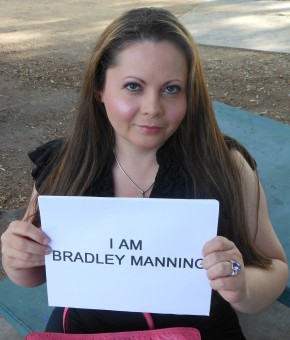Update 9/12/12: Understanding whistle-blowing, a WikiLeaks movie, and why this is a bipartisan issue
Understanding whistle-blowing and why the government wants to preclude that argument from the court. Nick Lyell, a reporter/blogger in Washington D.C., brings us another analysis via the Media Watchdogg blog. He describes three possible theories by which whistle-blowing can be viewed, one describing the view of the people currently in power, one from the perspective of those who wish to strengthen government and would encourage more traditional whistle-blowing, and another representing the wider democratic views of WikiLeaks and its supporters.
He concludes with regards to Bradley Manning’s case:
That the court will not permit evidence on the consequences of the leaks is dangerous. Any serious attempt at successful public policy, let alone justice, demands context, and difficult and complex as it is, this context includes the content, the intent, and the unforeseen consequences of the leaks.
Is it intelligent to treat a leak aimed at exposing an inept general to that of sharing advanced weapons secrets? Of course not. But that is effectively what the ruling does. At best, it is poor public policy; at worst, it is dangerous to US national security. Read more.
Submit your photo today at iam.bradleymanning.org!

Julia Davis, Department of Homeland Security whistleblower, whose story is featured in the documentary “Top Priority: The Terror Within”
The American Conservative defends Bradley Manning. In the American Conservative, veteran and historian Chris Bray explains how the politics behind Bradley Manning’s case are not about liberal vs. conservative in the modern sense, but instead about growing abuses by the political elite and the struggle to hold them accountable. Supporting Bradley is simply a sensible position for anyone who believes the power of the political elite should be kept in check the way America’s Founding Fathers intended.
Pulling at the masks that cover neoconservative and neoliberal foreign policy, Manning seems to have been engaged in a small-r republican project, looking for ways to give informed citizens the knowledge to restrain state power. Read more.
New movie describes motivation for WikiLeaks. Reaching beyond the drama encircling Julian Assange’s life in the present, Underground: The Julian Assange Story premiered at the Toronto International Film Festival last Saturday, focuses on his teenage years. A review of the film explains:
By the age of 17, while living in Melbourne, he becomes a father. Shortly after, in 1991, he is charged with 31 counts of computer fraud, having hacked into the US military’s top-secret Gulf War machine. To his horror, he has discovered civilian targets are being deliberately bombed as part of the American campaign. His attempt to expose the truth sets him on the path he finds himself on today.
The story of a young man whose entire worldview is shaken by discovering a particular military secret is reminiscent of an anecdote discussed in the chat logs attributed to Bradley Manning:
i think the thing that got me the most… that made me rethink the world more than anything… was watching 15 detainees taken by the Iraqi Federal Police… for printing “anti-Iraqi literature”… i had an interpreter read it for me… and when i found out that it was a benign political critique titled “Where did the money go?” and following the corruption trail within the PM’s cabinet… i immediately took that information and *ran* to the officer to explain what was going on… he didn’t want to hear any of it… he told me to shut up and explain how we could assist the FPs in finding *MORE* detainees…
everything started slipping after that… i saw things differently. i had always questioned the things worked, and investigated to find the truth… but that was a point where i was a *part* of something… i was actively involved in something that i was completely against…
Underground will air on Chanel 10 in October in Australia, and hopefully following that will be available elsewhere in the world as well.










